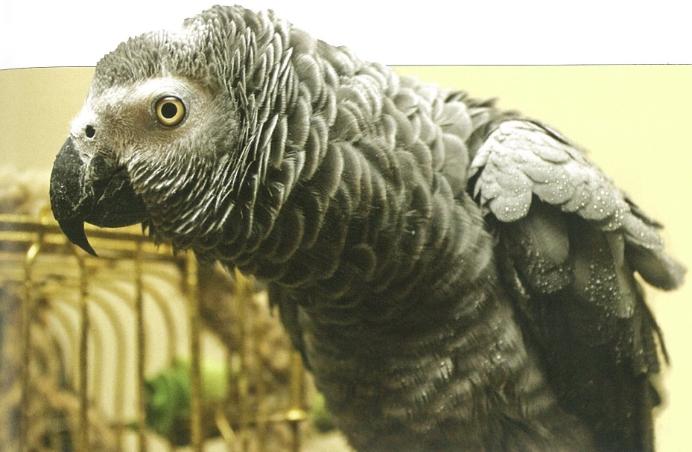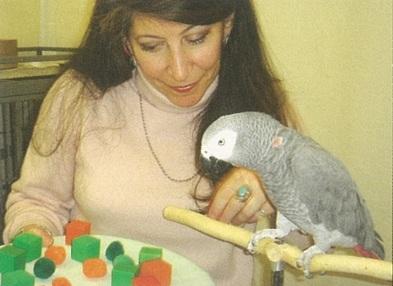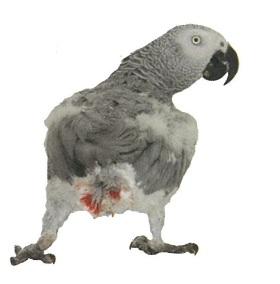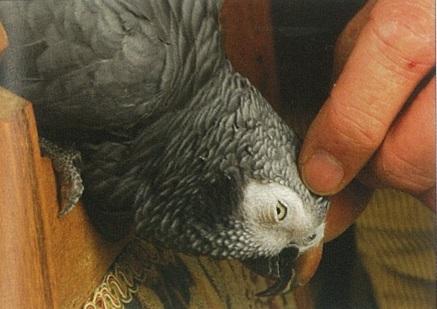While all parrots are very intelligent birds, most scientific work on parrot intelligence has been done on grey parrots. Greys can be taught to use human language in its proper context and can name hundreds of objects and
make requests for them to be given to them. They can name and classify hundreds of objects with regards to their colour, shape and sizes. Greys can also count (up to six!).
Compared with other parrots, such as Amazons, macaws, cockatoos and conures, grey parrots are usually less noisy and can be rather shy, almost introverted, birds. They tend to be very wary of new things, including new people, new toys or a change in their diet. Where this characteristic is seen in pet birds, it is partly due to the fact that the
bird is removed from its normal way of living, which would be within a flock of birds. Greys living in groups are much more confident birds than those who have to live on their own. Like other parrots, greys should not be thought of as 'easy-maintenance' pets who can spend all day in a cage. Deprived of the freedom of spending many hours each day out of their cage in the company of their carers, these birds become bored and the stress of boredom can cause them to show behavioural problems. Greys are very inclined to pick at their own feathers if any aspect of their care is neglected.
A calm household is needed
As highly intelligent birds they need a lot of stimulation. The carer must ensure that the bird can be kept interested in things, that it has access to a range of toys which are changed around regularly and that the type of household they are to live in is suitable for such a sensitive bird. Grey parrots do not do well in a house which is too busy with boisterous children or dogs or other pets running around. This would make the bird even more nervous and possibly fearful. Greys need to be with a family where the general atmosphere is calm and stable.
This allows their confidence to grow and over time the depth of their character will become apparent. Most importantly, before considering getting a grey, you need to be sure you really do have the time to care for such a demanding and sensitive creature. Greys are not easy birds to keep well as companion animals.
make requests for them to be given to them. They can name and classify hundreds of objects with regards to their colour, shape and sizes. Greys can also count (up to six!).
Compared with other parrots, such as Amazons, macaws, cockatoos and conures, grey parrots are usually less noisy and can be rather shy, almost introverted, birds. They tend to be very wary of new things, including new people, new toys or a change in their diet. Where this characteristic is seen in pet birds, it is partly due to the fact that the
bird is removed from its normal way of living, which would be within a flock of birds. Greys living in groups are much more confident birds than those who have to live on their own. Like other parrots, greys should not be thought of as 'easy-maintenance' pets who can spend all day in a cage. Deprived of the freedom of spending many hours each day out of their cage in the company of their carers, these birds become bored and the stress of boredom can cause them to show behavioural problems. Greys are very inclined to pick at their own feathers if any aspect of their care is neglected.
A calm household is needed
As highly intelligent birds they need a lot of stimulation. The carer must ensure that the bird can be kept interested in things, that it has access to a range of toys which are changed around regularly and that the type of household they are to live in is suitable for such a sensitive bird. Grey parrots do not do well in a house which is too busy with boisterous children or dogs or other pets running around. This would make the bird even more nervous and possibly fearful. Greys need to be with a family where the general atmosphere is calm and stable.
This allows their confidence to grow and over time the depth of their character will become apparent. Most importantly, before considering getting a grey, you need to be sure you really do have the time to care for such a demanding and sensitive creature. Greys are not easy birds to keep well as companion animals.

Greys are intelligent and complex birds and require much commitment from their carers
if they are to do well as companion birds. They have a similar life expectancy to humans.
if they are to do well as companion birds. They have a similar life expectancy to humans.

Irene Pepperberg tests one of her grey parrots,
Alex, on his knowledge of colours and shapes.
Alex, on his knowledge of colours and shapes.

This hand-reared grey has bitten off
some of his own feathers.
some of his own feathers.

Once a bird trusts you, he will love having his head scratched gently like this for brief periods. This is very comforting
for them.
for them.